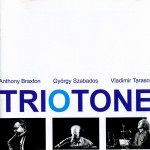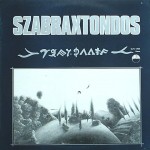Kérdés:
New Orleans csak a kezdet volt, és semmi nem volt előtte, semmi, ami fontos lett volna, és ezt a hagyományrendszert pontosan végiggondolták. Elmagyarázná, hogy mit ért ez alatt?
Anthony Braxton:
Először is köszönöm a kérdést. Véleményem szerint létezett egy nagyon kreatív zenei hagyomány az utóbbi 2000 évben, amit nem mindig értettek. Ha a nagy európai zenékre gondolok, akkor a fejlődésre gondolok a görög daloktól a gregorián énekekig, a modern korig és a New Orleansi zenék felbukkanásáig. És remélem, hogy a jövőben elválasztjuk a fajok és politikák koncepciójától a zene témáját, mert a zene a politikai erőjátékon átlép, a zene átlép a nemzeti erőjátékon, és remélem, hogy a jövőben egy holisztikus szempont figyelembe vesz egy kozmopolita realitást, hogy gyerekeinkkel meg tudjuk értetni az élet szépségét és minden zene fontosságát. A zene nem politika, a zene arra tud inspirálni, hogy a tőlünk telhető legjobbat tegyük. Az az érzésem, hogy különösen manapság a zene tárgyában valami elferdülést tapasztalunk, olyasmit, ami sok esetben azt mondja, hogy az afrikai zenék fontosabbak, mint a világ többi része, de szerintem minden zene fontos.
Én úgy gondolok magamra, mint hivatásos zenetanuló, és mint tanuló szabad vagyok, hogy folytassam a tanulást, mert még annyi területe van a zenének, amiről nem tanultam, és így a válaszom a kérdésére, hogy egy mélyreható manipulálás korszakának közepén vagyunk. Ahogy tudja, az USA-ban éppen most döntötték el, hogy megtámadják Irakot az ENSZ felhatalmazása nélkül, és most van egy nagy problémánk. Ami engem illet, a gondolat, hogy a New Orleans zene felette áll a világkultúrának, Amerika problémájának a része: a nacionalizmus pszichológiájának része, de az én véleményem szerint a New Orleansi zene dinamikus következményei szerint köszönetet mond a világ zenéjének, mert minden zene egymással kapcsolatban áll.
Azt mondom a tanítványaimnak, hogy a nagy összeurópai zene nélkül nem lenne tonalitás, nem lenne egymással összefüggő zenei rendszerünk. A zenetanulás és felfedezés kihívásának része szerintem a teljes emberiség felfedezése a Mindenségben, és ez a tudás alázatossá és nem agresszívvé kellene, hogy tegyen minket. És hogy kérdésére feleljek, úgy érzem, hogy olyan korban élünk, ahol sok új lehetőség van. Amerika komoly hibát követett el. De a jövőben, még mindig azt hiszem, hogy léteznek pozitív lehetőségek, ha megtaláljuk a módját, hogy az embereket összehozzuk, és folytatjuk a zenélést. Például, sokat tanultam azáltal, hogy zenéltem ezzel a nagyszerű emberrel és ezzel a nagyszerű emberrel. És ez nem amerikai dolog. Amerika a világnak csak egy része, nem az egész világ. Ez lenne hát a válaszom.
Kérdés:
Braxton úr, miféle kihívás vezeti Önt ahhoz, hogy új zenészek csoportjával játszik, új találkozásokhoz, mint ezzel a két úrral, akik most itt vannak, és hogy a legtöbb kompozícióját egyszerűen úgy hívják, hogy ilyen és ilyen számú kompozíció. Ha ennek a ma hallott hosszú darabnak, ami a mai estének legnagyobb részét betöltötte, a mai koncert legnagyobb motivációja volt, van egy külön története, akkor tudna erről mesélni valamit
Anthony Braxton:
Rendben. A kérdés első részére ezt mondanám: az elmúlt 35 év alatt azon dolgoztam, hogy felépítsek egy zenei rendszert, amely visszatükrözi azokat a példákat, amelyekből tanultam, és szerencsés és hálás vagyok, hogy képes voltam felfedezni, hogy mit akarok csinálni az életben. Ugyanakkor, mindig nagyon fontosnak tartottam, hogy eltávolodjak a saját zenémtől és mások zenéjét is játsszam, hogy tovább tanulhassak. Én csak hivatásos zenetanuló vagyok, nem mester, boldog tanuló vagyok, és részben azért vagyok boldog tanuló, mert szerencsém van, hogy ilyen emberekkel találkozhatok, mert, amikor Szabados úr zenéjét játszom, megváltozok, nem Braxton vagyok, a legjobb tudásommal akarok játszani, hogy zenéjét helyesen játsszam. Ez más kihívás. Ezért értékelem annyira a barátokat, akikkel találkoztam, és a zenészeket, akikkel dolgoztam Európában.
Még hozzáteszem: szívemből mondok köszönetet az európaiaknak. Európa nélkül nem lett volna zenei karrierem, mert Amerikában nincs munka. Nagyon érdekes, az élet érdekes és összetett. Bár Chicagóból jövök, de ha ezekkel a fickókkal találkozok, akkor úgy érzem: Ah! Ezek a testvéreim! És így egyrészt próbálok olyan zenei rendszert kifejleszteni, ami az érdeklődésemet tükrözi. Próbálom John Coltrain, Karl Heinz Stockhousen, John Cage, Ornette Coleman , Hildegard von Bingen, és Johann Sebastian Bach szellemében kifejleszteni. Ugyanakkor, mivel veszélyes, ha az ember csak a saját zenéjét játssza, megpróbálok kilépni a zenémből és néha standard repertoárt játszani, egy kis Bachot, Vlagyimirral dolgozni, aki nagy muzsikus, és játszani Szabados úr nagyon nehéz zenéjét.
Lehetetlen ember. Keményen megdolgoztat, és szeretem ezt.
Kérdés Szabados Györgyhöz:
Mi volt, ami ezt a 3 felvételt és különböző szellemiségből jövő embert összetartotta ma este a zenében?
Szabados György:
Én azt tapasztaltam az életem során, és gondolom korábban is az emberek ezt tapasztalták, ugyanígy éreztek, hogy a világ különböző helyein hasonló időkben majdnem azonos jelenségek bukkantak elő a művészetekben, de a közérzetben is. És előbb utóbb ezek a jelenségek, ezek a tünetek, amik előbukkannak, megtalálják egymást. Ma este ezekről a dolgokról elég sokat beszélgettünk a koncert után, és hogy ez mennyire így van, erre koccintottunk is. Mert rádöbbentünk arra, hogy mi egy család vagyunk. Ez azt jelenti, hogy ma a világban teljesen más szempontok szerint kezdenek el, vagy jönnek létre találkozások, és alakulnak ki bizonyos szemléleti különbözőségek. Nem fajták szerint, nem osztályok, nem filozófiák szerint, hanem valami módon az időtlenség, ami a legősibb dolog a világon, tehát a mozdíthatatlanság, az állandóság minősége szerint, és szellemi szintek szerinti kapcsolatok jönnek létre, és ez a legfrissebb, amit erről pillanatnyilag azonosítani vagy mondani tudok.
Hadd utaljak arra, hogy a történelemtudomány, amely nem hatalmat szolgál, hanem megpróbálja a dolgokat a maguk valóságában azonosítani, lassan arra jut, hogy valamikor az ősidőkben egy egységes kultúra volt ezen a földön. És az a gyanúm, hogy azzal, hogy mi a világ legkülönbözőbb helyein született emberek azonos módon, egy azonos attitűddel kezdünk el művészkedni, és ennek az attitűdnek az a lényege, hogy szabadon zenélünk, a lehető legkevesebb kötöttséggel, miközben a zenéről szinte mindent tudnunk kell. A lelkünk, szellemi lényünk legmélyéről előjön ez az egységes kultúra, amit őrzünk magunkban és újra megszólal.
Nyilván vannak különbségek bizonyos karakterisztikus jegyek, mert hiszen más helyekről származunk és más kultúrákból, de pontosan ez a dologban az érdekes, hogy itt egy feloldódás indult, és ennek a mélyén egy olyan dimenzió bukkan fel, ami már az emberen túli. Vagy az embernél mélyebb.
Anthony Braxton:
A CD-kre gondol? Nagyon meglepődtem, hogy kaptam CD ajándékot olyan zenével, amit a nyolcvanas években játszottunk, köztük koncertekkel Szabados úrral. Ez a múltnak része. Szerencsésnek tartom magamat, hogy eljöhettem Európába és olyan emberekkel találkozhattam, mit Szabados úr és Vlagyimir. Tanulmányoztam a lemezeit még sokkal előbb, minthogy találkoztunk. Megvolt mind a Ganelin Trio zenéje.
Mindig közel éreztem magamat Oroszországhoz. Ezért nagyon meglepett ez az ajándék. Hazaviszem, élvezni fogom, és lemásolom, és küldök belőle ennek az embernek (Szabadosnak), és 10 000 dollárt fogok kérni érte! Ha ha ha – 10 000 eurót.
Kérdés:
Azt szeretném kérdezni mindhármuktól, és bizonyára már a válasz is megvan, hogy mit jelent Önöknek, hogy itt Kanizsán találkoztak egymással, ezen a helyen.
Vladimir Tarasov:
Mindig a családról beszélünk itt, és tényleg igaz: a világ kicsi, a család kicsi, és most családunk része… Amikor Kanizsára jövök, tudják, Kanizsa két nagyon jó barátom nevével van összekötve, Nagy József és Bicskei Zoltán nevével, akit idén 20 éve, hogy megismertem. Aki a mi koncertünket és fesztiválunkat szervezi, amikor Újvidéken dolgozik, én 83-ban, Braxton 84-ben járt ott. Tehát nem a helyről van szó, hanem az emberekről, mert valóban egy család vagyunk. Ha Zoltán holnap más faluba költözik, akkor is eljövünk, és ugyanazt csináljuk.
És hogy folytassuk a családról … várjál, ne menj el.
Amikor játszunk zongorán, szaxofonon és dobokon, és mindenki kérdezi: emlékszel, amikor külföldön játszottunk, vagy Oroszországban, ami akkor kommunista ország volt… Miért választasz másik zenészt, esetleg egy másik basszusgitárost, mi is örömmel jönnénk, de nem éreztük úgy, hogy ez a zenész beleillene a családunkba. Az az igazság, hogy 280 millió emberből nem találtunk egyet sem. Ez az igazság számomra és a dobos számára is, akinek jazz és klasszikus képzése van. Azt mondom a tanítványaimnak, mert tanítok is, hogy a hang nagyon fontos, de éppen olyan fontos a szünet is két hang között, Van a világon több zenész is, akivel szeretnék játszani, de György és Anthony – arról álmodtam, hogy velük játszassak, a kollégáimmal, mert érzem a hangok között a levegőt, és nem csak hang van, hanem van valami benne is. Amikor hallottam Zoltántól a lehetőségről, hogy megvalósuljon az ötlet… higgyék el, nagyon örülök neki. Köszönöm.
Kérdés:
Miért van az, hogy a mai hiteles zenék általában a jazz fesztiválokból szorulnak ki?
Szabados György:
Nem hiszem, hogy ez kiszorulás, abszolút szemléleti kérdés, hogy hol van a világ közepe, vagy hogy honnét nézzük a dolgokat, ez mindig relatív. Általában a köztudat valamilyen hivatalosság szemléletével ítélkezik és szemléli a dolgokat maga is. És ezért gondolja azt, hogy ezek a fesztiválok, amelyeket jazz fesztiválnak hívunk, ami egyébként nem pontos kifejezés erre, ami Kanizsán rendszeresen történik. Ezt kiszorulásnak vagy periférikus jelenségnek és helynek gondolja, holott ez sosem így volt. Mert amikor pl. Görögországban megszületett az a görög kultúra, ami az európai kultúránknak a fundamentuma, legalábbis így tekintik azok, akik ezzel foglalkoznak, az egy egészen kicsi hely volt, ahol olyan emberek éldegéltek egy adott pillanatban, akik egy olyan elementáris és több évezredre kiható kultúrát teremtettek meg, ami ugyan nem volt eredeti, mert keletről átvett szemléletmód alapján született, tehát a keleti vagy archaikus vagy tradicionális gondolkodást európaizálta, vagy inkább mediterranizálta, de abból született az európai kultúra. Itt mindig azt kell megnézni, hogy a genius loci, egy helynek a szelleme, mennyire kvalifikált, abban milyen szellemi minőség szunnyad, vagy bontakozik.
Annyit még hozzátennék, hogy itt az, hogy jazz fesztivál, azért jó kifejezés, mert végeredményben a jazz jelenség, (csak jelenségeket tudok megpillantani a világban, mert a világban jelenségek vannak), a jazz jelenség egy nagyon fontos jelenség volt a 19-20. század fordulóján, mert valahonnan az ősidőkből, őskultúrából a feketék zenéje révén egy olyan életteret varázsoló hatást hozott a rögtönzés, az improvizativitás révén – ez a lényege – a világ zenekultúrájába, ami aztán nemcsak zeneileg termékenyítette meg a gondolkodást, az egész civilizáció gondolkodását. Hanem egy felszabadító hatás volt és tudjuk, hogy a zene a legmélyebb hatóerő, mindennél mélyebb hatóerő.
Mindkettőjüket szeretném megkérdezni:
Mit jelent Önöknek a magyar népzene gyökere, a magyar népzene, és mennyire érezték ezt a mai koncerten?
Anthony Braxton:
Amikor legelőször felfedeztem Szabados úr zenéjét, ami vonzott ehhez a zenéhez az volt, hogy mély kapcsolatot éreztem az ő munkája és Bartók Béla zenéje között, például, és a magyar népzenei hagyományhoz, ami mindig vonzott engem. Amikor fiatal voltam, sok időt töltöttem Bartók zenéjének tanulmányozásával, és nagyon érdekelt a népzene felhasználása a modern korban, de még inkább, hogy létezik Bartók zenéjében egy nagyon különös érzés/érzelem/lelki rezdülés, és Szabados úrnak is van a kompozícióiban és improvizációiban egy nagyon különös érzés, lelki rezdülés, és amikor alkalmam van Szabados úrral játszani, akkor az arra is alkalom, meg megtapasztaljam ezt az érzést, rezdülést és tanuljak belőle. Nagyon egyedi érzés és vibráció. Nagyon szép, de a szép szó nemigen közelíti meg, amit mondani akarok. Valami ekörül, valami a nagy orosz zenék körül. Nagyon különös érzés. Az én zenémről általában azt mondják, hogy nagyon hideg, nagyon józan. De egyébként nagyon érdekel a zene szellemisége, érzelmi dinamikája. És a remény dinamikája. És így kezdettől fogva, amikor először hallottam ennek az embernek a zenéjét, azt mondtam magamnak: O-la-la!
Kérdés:
Sokat olvastam Önről közben, de soha nem hallottam Újvidék és Kanizsa között. De a lényeg, hogy sokat vitatkoztak Önről, néhány cikkben megsemmisítették. Dicsérték, hősként kezelték. Nagy ellentmondás. Amit egyébként kérdezni szeretnék: Idézek az egyik enciklopédiából, amit néhány napja olvastam. Ezt írja: Braxton éppen annyira zeneszerző mind újító és felhasznált – és ez a kulcsszó – matematikai összefüggéseket, diagramokat és formulákat mind a kompozíciói mind a játéka alapjául. Ez a Rough Guide, amit Angliában publikáltak néhány éve. De karrierje kezdetén, azt mondja, tanult harmóniát, komponálást és filozófiát. Életrajzának ez a része, és a cikkírónak ez az állítása ütközik vagy egyezik? Ez a kérdésem. De talán az okozta az ellentmondást, mert túlságosan intellektuális néhány kritikus, a kollégáim és a hallgatóság egy részének számára. Bocsánat, ez a kérdésem.
Anthony Braxton:
Hadd válaszolom meg a kérdést. Azt hiszem, a munkámat körbefogó bonyolultságok abból a problémából erednek, hogy afroamerikai vagyok ellentétben az általánosító afroamerikai meghatározással. Igen, nagyon érdekel a matematika és a filozófia is. Nagyon érdekel a spiritualitás. Egy “személy” akartam lenni, és innét indulva tanulni, mint bárki más.
De az engem körülvevő probléma éppen úgy származik az afroamerikai közösségből, mint a fehér amerikai és az európai közösségből: nehézségük van azzal, hogy a munkám alapján úgy tekintenek rám, mint aki ellentétben áll azzal az elképzeléssel, hogy egy afroamerikainak csak hip-hopot vagy ilyesmit kellene játszani. Azt hiszem, a modern kor elképzeléseinek része az a szemlélet, mely szerint Afrika soha nem adott semmit az emberiség intellektuális dinamizmusához; az afrikaiak inkább az érzelmekben nagyok, az európaiak nagyon intellektuálisak, de nincsenek érzelmeik az afrikaiakkal összehasonlítva.
Ezeket rasszista szempontoknak tartom, vagy torz szempontoknak, és az az érzésem, hogy a következő kor kihívása az lesz, hogy létrejöjjön egy olyan megértés az emberiségben, ami előre fog vinni minket. És a munkám is, például ha azt mondanám: “Neki a falnak, a k. anyját” – akkor mindenki azt mondaná: Braxton fekete. Braxton fekete.
Miért van az, ha trágár vagyok, vagy ha valami banális szempontot alkalmazok, akkor feketének néznek. Valójában pedig az afroamerikaiak olyanok, mint sok más ember. Sőt, azt mondanám: ennek a kornak az egyik komplexitása szerintem az, hogy még az afroamerikai közösség és vezetés is leredukálja azokat a paramétereket, amelyek megadják, hogy mit jelent a fekete. Manapság mélységes redukcionizmus van. És az én zeném éppen a közepében van. Miért? Mert kezdettől fogva, fiatalemberként sem tapasztaltam ellentétet Európával szemben, és mint ilyen, megpróbáltan tanulni mindenből, amit szeretek, minden zenéből, amit szeretek; ha szerettem, szerettem. Vindikáltam magamnak a jogot, mint bárki más, hogy szerethessem, amit szeretek és akkor próbáljam meg a legjobbat adni magamból.
De az volt a probléma az afroamerikai nacionalisták, vagy a középosztály, vagy akár a fehér amerikaiak, sőt néha az európai értelmiségi körök részéről, hogy nehéz olyan afroamerikait kezelni, aki magáévá tette az egyetemes értékeket. Mert nagyon kényelmesek a sztereotip elgondolások: blues és swing – blues és swing. Miénk a ritmus – miénk a ritmus. De nem a miénk a ritmus, mindenkinek van ritmusa. Bachnak is megvan a ritmusa. Webernnek is van ritmusa.
Meg kell találnunk a módját, hogy megvizsgáljuk a kreativitás és információk gazdagságát, ami a bolygónkon létezik. Szerencsések vagyunk, hogy élhetünk. És amikor zenéről van szó, nagyon nehéz jó zenetanulónak lenni, ha nem tiszteljük az univerzalitást. Mert a zene mindenhonnan jön. A zene nem birtoka senkinek, senkinek nem birtoka a spiritualitás. És így a zeném sokféle probléma közepén áll. Túl intellektuális? Mit értenek az alatt, hogy túl intellektuális? Mindig szenvedéllyel közeledtem a zenémhez, szenvedéllyel a matematikához, az érzelmekhez, az improvizációhoz. És néha nem szenvedéllyel. A tanulás érdekel. És így jó céltáblája lettem a kritikának. Azt mondom, rendben van, folytassátok, kritizáljatok. Elfogadom a kritikát.
Amit kezdettől fogva szerettem volna, képességeimből a legjobbat kihozni, becsületes lenni, tanulni, mint mindenki más. Ez nem fekete, nem fehér, nem zöld, nem ázsiai.
Nem vagyok több mint akárki, akinek volt olyan szerencséje, hogy felfedezett valamit, amit szeret.
 Anthony Braxton/Szabados György/Vlagyimir Tarasov – részlet a 2003. évi Kanizsai Jazz Fesztiválon felvett interjúból magyar, angol és német feliratozással
Anthony Braxton/Szabados György/Vlagyimir Tarasov – részlet a 2003. évi Kanizsai Jazz Fesztiválon felvett interjúból magyar, angol és német feliratozással


 2003: Triotone (Braxton–Szabados–Tarasov)
2003: Triotone (Braxton–Szabados–Tarasov) Anthony Braxton/Szabados György/Vlagyimir Tarasov koncertje Magyarkanizsán a 2003. évi Jazz és Improvizált Zenei Fesztiválon
Anthony Braxton/Szabados György/Vlagyimir Tarasov koncertje Magyarkanizsán a 2003. évi Jazz és Improvizált Zenei Fesztiválon A koncert alatt és után felvett képek
A koncert alatt és után felvett képek Magyarkanizsai Jazz és Improvizált Zenei Fesztivál
Magyarkanizsai Jazz és Improvizált Zenei Fesztivál Bicskei Zoltánról
Bicskei Zoltánról Szabados György és Anthony Braxton együtt
Szabados György és Anthony Braxton együtt Anthony Braxtonról
Anthony Braxtonról
 1982: Szabados & Braxton Győr (HU) 1982.
1982: Szabados & Braxton Győr (HU) 1982.
 1983: Braxton & Szabados Duo, Daxberger Situationen ’83 (DE)
1983: Braxton & Szabados Duo, Daxberger Situationen ’83 (DE)
 1984: Szabados & Braxton Debrecen (HU)
1984: Szabados & Braxton Debrecen (HU)


 1984: Szabraxtondos
1984: Szabraxtondos


 2003: Triotone (Braxton – Szabados – Tarasov)
2003: Triotone (Braxton – Szabados – Tarasov) Szabados György – Vladimir Tarasov Duo
Szabados György – Vladimir Tarasov Duo Tarasov Vladimir
Tarasov Vladimir
 2006: Szabados & Tarasov Kanadában.
2006: Szabados & Tarasov Kanadában.